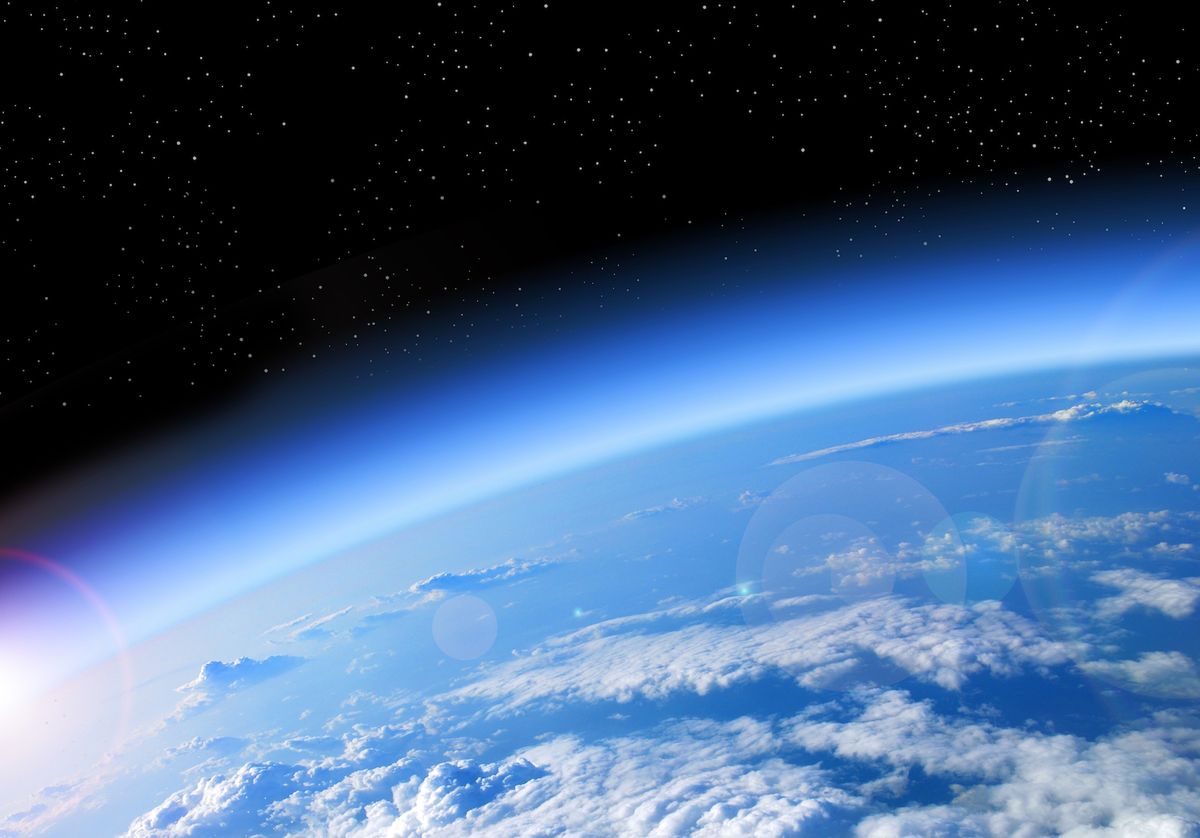Even though air is lighter than our bodies, the total mass of the atmosphere is still enormous, amounting to 5.1 trillion kilograms (11.24 trillion pounds).
Earth's atmosphere is a giant layer of air that envelops the planet, extending tens of miles above the surface. The boundary between the atmosphere and space, called the Kármán line, is about 62 miles (100 kilometers) high. However, nearly all of the atmosphere's mass, 99.9 percent, is concentrated below 30 miles (48 kilometers), according to Rutgers University atmospheric sciences professor Anthony Broccoli.
Even though air is lighter than our bodies, the total mass of the atmosphere is still enormous, amounting to 5.1 trillion kilograms (11.24 trillion pounds). On average, a column of air just 1 foot (0.3 m) in diameter has a mass of 754 kilograms (1,663 pounds).
So why aren't we crushed by the pressure from the air?

Air pressure is evenly distributed
Air pressure does not just apply downward pressure, but is distributed evenly throughout the body. Air moves around the body, creating a uniform force on all parts. This means that air pressure is not a simple downward force, but surrounds all sides of the body, helping to maintain balance.
Professor Broccoli explains that the average air pressure on the body is about 14.7 pounds (6.6 kg) per square inch (1 kg/cm²) — equivalent to the weight of a large bowling ball placed on each square inch of skin.
The human body has evolved over millions of years to withstand this pressure, says Michael Wood, a professor of quantitative science at Canisius College. A key factor is that the pressure inside our bodies is always balanced with the pressure outside, thanks to the air inside our bodies creating an outward force.
When this balance is disrupted, the body will feel the air pressure more strongly. For example, if a vacuum nozzle is placed against the skin and sucks out all the air, you will feel the full weight of the air column pressing against that area.
Pressure decreases as altitude increases
Air pressure decreases as you go up in altitude, as the air becomes thinner. This is why you often feel your ears pop when you fly on an airplane. This happens because the pressure inside your body needs time to adjust and equalize with the pressure outside.
In space, the pressure is almost zero, and there is no air force pressing down on the body. In this condition, the pressure inside the body will cause the body to "inflate like a balloon" until the pressure is released. That is why astronauts need to wear space suits to maintain a stable pressure around the body.
As Professor Wood shares: "Air pressure is an important part of sustaining life on Earth, but it is also the reason why living in space without support equipment is impossible."
Source: https://giadinh.suckhoedoisong.vn/vi-sao-con-nguoi-khong-bi-de-bep-boi-ap-suat-khong-khi-du-bau-khi-quyen-nang-toi-51-ty-ty-kg-172241127072841992.htm


![[Photo] Top players gather at the 2025 Nhan Dan Newspaper National Table Tennis Championship](https://vphoto.vietnam.vn/thumb/1200x675/vietnam/resource/IMAGE/2025/5/23/9ad5f6f4faf146b08335e5c446edb107)





























































































Comment (0)